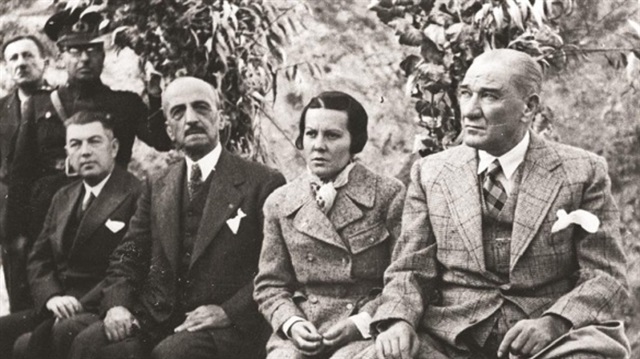Seyit Rıza was hanged after refusing to apologize for rebellion: report

The report says the Kurdish rebel leader refused to apologize for his alleged part in Dersim rebellion when he secretly met with Atatürk just an hour before his execution in October, 1937
Seyit Rıza, a tribal leader who was executed for leading the Kurdish uprising in Dersim, could have still lived if he had apologized for his alleged part in the rebellion, says a situation report, provided to the headquarters of the National Security Service in the capital of Ankara.
The Zaza tribe leader, Seyit Rıza, was taken to the Elazığ central train station to meet with modern Turkey's founder, Mustafa Kemal Atatürk, for a clandestine meeting which was arranged by the Secret Service before the last hearing of the Dersim trial in the eastern province, said a situation report, penned by a member of the National Security Service.
Seyit Rıza and other suspects, who were put on trial in Erzincan, were found guilty of being involved in a rebellion against the regime's – what they say – “oppression" and “discrimination" in the Kurdish-dominant province of Dersim, currently called Tunceli. His son was among the suspects who was given the death sentence at the end of the trial.
The military launched a strafing campaign to crush the rebellion in the late 1930s, using both poisonous gas and dropping bombs. Nearly 13,000 people were killed in the bombing. The campaign also claimed the lives of his wife, three grandchildren and one of his sons.
Seyit Rıza was detained and jailed in Elazığ prison on Sept. 10, 1937, after an officer deceived him by lying; saying that Atatürk was waiting for him in Erzincan's governor's office to meet with him to propose peace.
Atatürk received the Zaza tribe leader under strict security measures in a special train, which stopped at the central station in Elazığ during his trip to the eastern regions three days after his departure from Ankara.
Seyit Rıza was escorted aboard the train by the Secret Service spy who fluently spoke the Zaza dialect of the Kurdish language. No official or passenger was allowed in the central train station for safety's sake. Rıza was travelling with the Malatya police chief's car in a convoy including four vehicles.
The meeting was also attended by the then prime minister Celal Bayar, the then Malatya police chief İhsan Sabri Çağlayangil, a close aide of Atatürk and two army inspectors, General Kazım Orbay and Lieutenant General Hüseyin Abdullah Alpdoğan.
Atatürk recalled he would not be executed if he accepted to express his regret and apologize for his alleged part into the revolt
during the highly tense meeting. The rebellion leader refused to apologize, saying that they did what they did to ensure security for their life and property, and that they did not rebel against the authority.
“After the Dersim law went into effective, I understood well whatever we will do, it will not be enough to stop you. Because your plan was actually to destroy Dersim totally. I do not feel regret for anything I have done. I do not want to be pardoned," Sayit Rıza said. He was referring to the law that changed the original name of the eastern province to Tunceli in 1935.
Atatürk cut short the strained meeting and Rıza was taken to the square where he was executed with other convicts.
Seven rebels, including Seyit Rıza and his son, were sentenced to death, while 14 others were acquitted and the remaining of them received various sentences in the last hearing of the Dersim trial.
After the hearing, which lasted nearly one and a half hours, the judge also issued a special ruling to lower Seyit Rıza's age from 75 to 57 and raise his son's age to 21 from 17.
The co-defendants were hanged at the gallows in the provinces' Buğday Square, just an hour after the court unveiled its verdict.
The Kurdish convict requested that his execution be carried out before his son's so would not see his death; but his son was hanged in front of his eyes.
Reklam yükleniyor...
Reklam yükleniyor...







Comments you share on our site are a valuable resource for other users. Please be respectful of different opinions and other users. Avoid using rude, aggressive, derogatory, or discriminatory language.